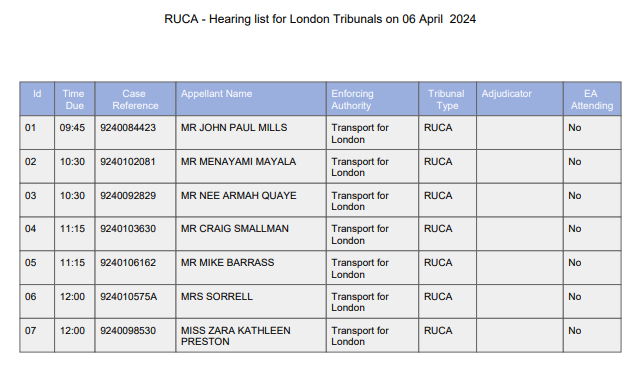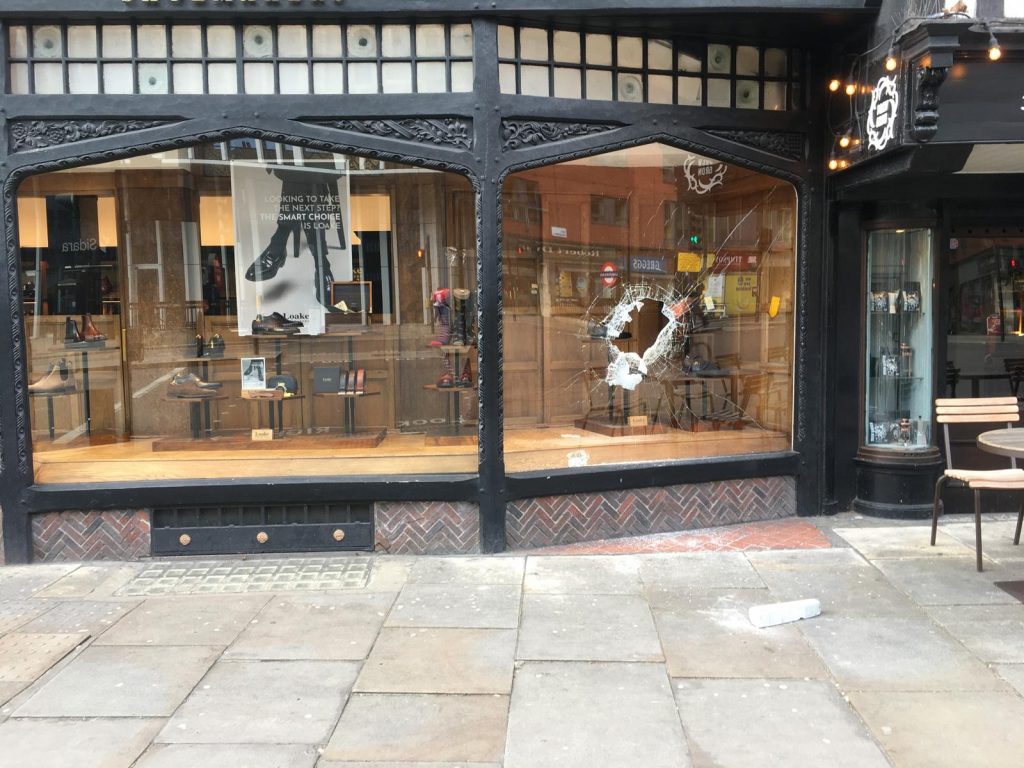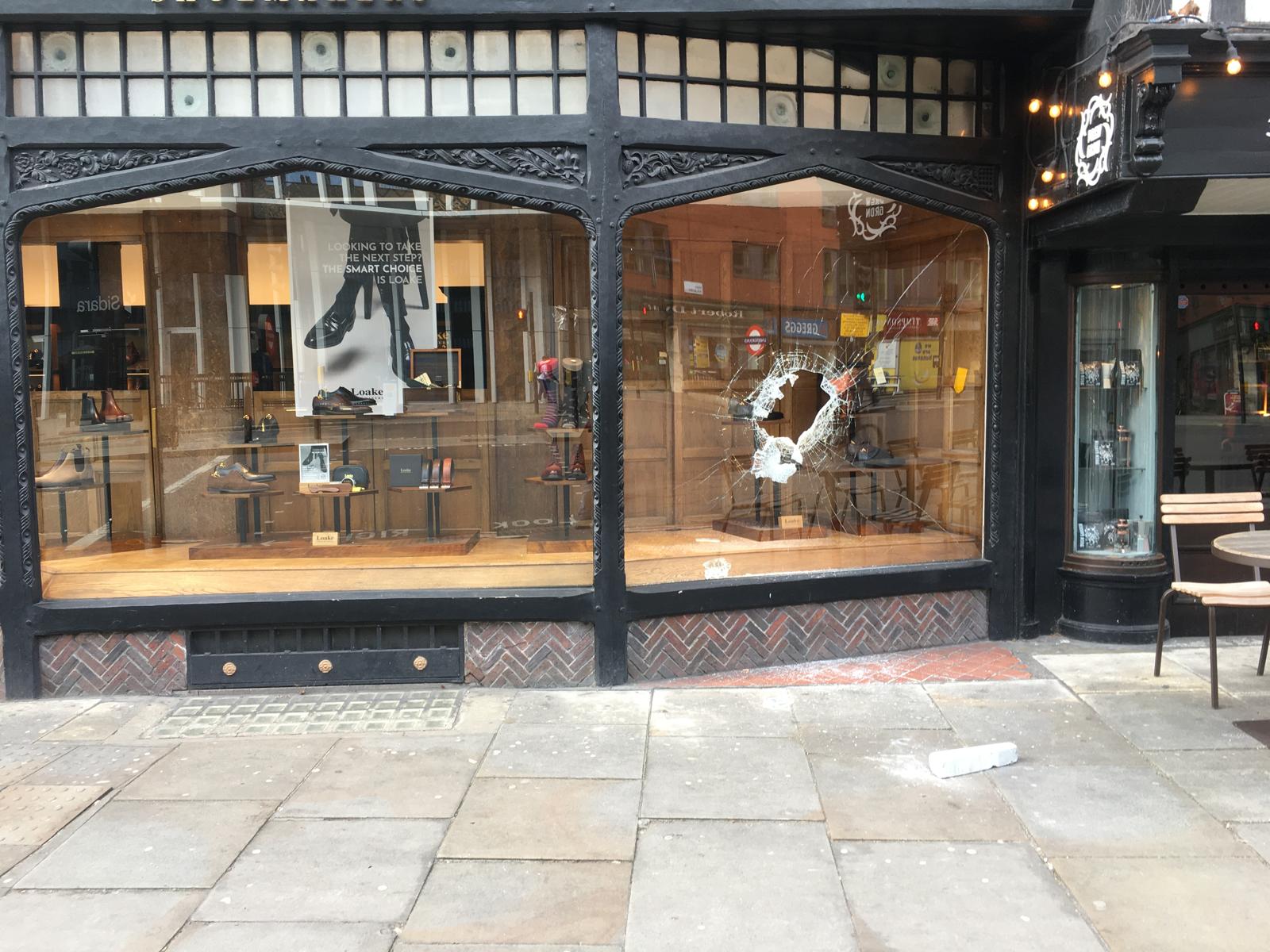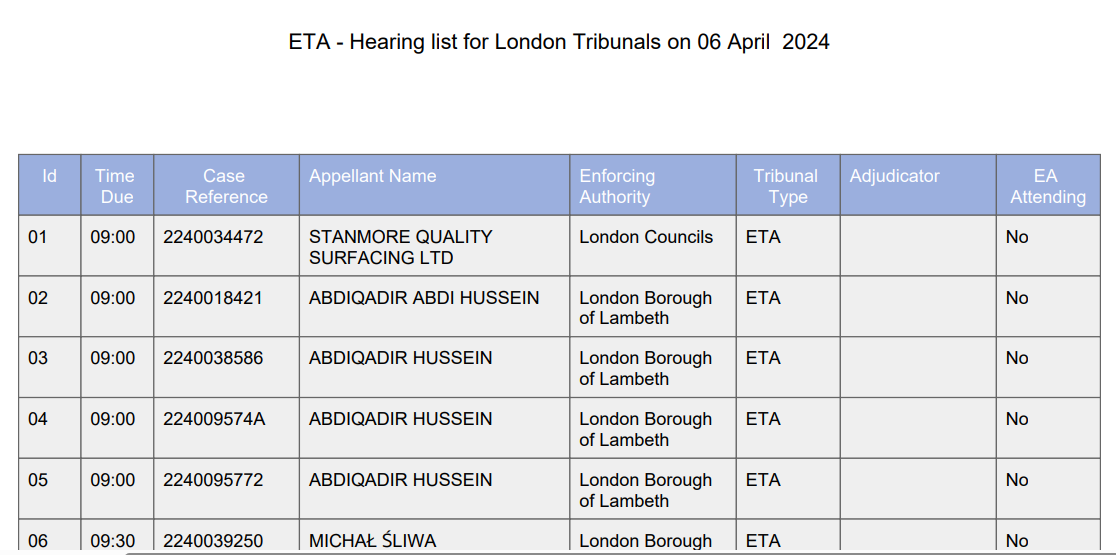Finding myself in London on a Saturday and with nothing booked (unusual for me), I suddenly remembered that the Environment and Traffic Adjudicators (mostly Parking and other traffic infringement penalty charge notices) and the Road User Charging Adjudicators (that's Congestion charge and Ultra-low emission scheme zone (ULEZ) to you and me) sometimes hold hearings on a Saturday.
And this Saturday was my lucky day - both the ETAs and the RUCAs were planning to be hard at work, hearing appeals against penalty charge notices.
There were 19 cases scheduled for hearing on the ETA list, and a further 7 cases on the RUCA list, so plenty for me to observe.

So I set off just after 8am to try and get to the hearing centre in Furness Street, Holborn to be in time for the first scheduled hearing at 9 a.m.
It's a 40 minute bus ride on the 98 and, for me with a Concessionary Travel bus pass, it's a free ride down to Red Lion Square and then a 5 minute walk, past Chancery Lane tube station to Furness Street. As I pass the tube station I was surprised to see that one of the windows of Loakes, the shoe makers, have been smashed in - obviously very recently, as the weapon used - a chunk of concrete was lying on the pavement surrounded by shards of broken glass, A hole the size of a football had been smashed in the shop front window.
Now, it was approaching 9 a.m. and I did not want to be late for the first hearing, but Furness Street was in sight, so I stopped, thinking what I might be able to do to help in this situation. First of all, I took a photo of the crime scene.

And then, finding a landline telephone number by the front door, I phoned and left a voicemail message advising the owners/manager of the damage and leaving the time and date of the call. I also tweeted the picture and tagged the Metropolitan Police in it, so that they at least were aware of the attempted break-in / criminal damage. Citizen's duty thus done - I hurried on to the Tribunal centre.
The security guard at the main reception in the building recognised me and said, "hello again" as I walked in, which was nice. I called a "hello, good morning" across as I entered the Tribunal reception area. Here again, I got a nice warm welcome from the receptionist who said, "Good morning, Mr Bell". Replying "Good morning", I walked over to the waiting area and took a seat.
[I have to say that the receptionist on duty today was extremely professional and went out of her way to be as helpful as possible. She also clearly understood that members of the public could observe the hearings and did whatever she could to enable that. This was a really pleasing change from the attitude towards Open Justice that I had encountered on earlier visits when other staff were on duty. There were several other welcome changes that I noticed as well which I will cover as they come up in my notes.]
The first hearing that I observed was a hearing by telephone. The appellant, Stanmore Quality Surfacing Ltd were represented on the phone by Mr Ivan Murray-Smith, who is a councillor in Great Yarmouth who, since getting a Penalty Charge Notice himself some years ago, now spends his "spare" time assisting others (I know not whether pro bono or for a fee) with their PCNs. The case was about a lorry ban order and unusually the PCN was one issued by London Councils themselves (usually it is a London borough or Transport for London (TfL) who issue the PCNs).
The adjudicator called Mr Murray-Smith using the hands-free loudspeaker on the telephone, so that I could hear both what the adjudicator was saying and what the appellant's representative was saying. [Contrast this with my earlier observations when most adjudicators were either using a headset or an ear piece on the phone, which meant I could only hear their side of the discussion. Now, at all of the telephone hearings that I observed today, the adjudicators put the phone on loudspeaker - another win for Open Justice.]
My Murray-Smith had submitted written representations and the Adjudicator, Belinda Pearce, seemed to be agreeing with his representations. She said that she "was struggling to find any signs sent in by Councils" and (referring to an earlier case that Mr Murray-Smith had cited) that she "concur with my colleagues and make a like decision" - which I took to mean that the appeal was allowed.
The adjudicator then moved on to consider an application for costs in another case - Michal Sliwa v London Borough of Waltham Forest, case 2240039250, where Mr Murray-Smith was again representing the appellant. From what I could gather, the authority had discontinued their pursuit of a penalty at some stage and had given as a reason "processing error". The adjudicator stated that she could not "go behind that".
For a costs award to be successful the adjudicator has to find that the actions of the authority, on the evidence before the adjudicator and applying the civil standard of proof, that is on the balance of probability, wholly unreasonable.
Belinda Pearce said that she found the Council's action to be unreasonable but not wholly unreasonable. She said that, had the Council proceeded, then she would have found there was a procedural impropriety, but it had not done so.
My Murray-Smith argued that the Council had resisted the appeal, but the adjudicator said that since they did eventually decide not to resist the appeal and the matter had not gone to a hearing at the Tribunal, then, yes, it was unreasonable, but not wholly unreasonable. Mr Murray-Smith pointed out that one of the Council's assertions was false and they had issued the rejection outside the 56 day period. In his opinion, no reasonable authority could possibly reach that decision.
Adjudicator noted that the authority say they had sent a notice but had not produced the notice.
Mr Murray-Smith insisted that the authority has not provided any document and the decision objectively is wholly unreasonable. He suggested that the adjudicator could direct the authority to clarify whether the notice WAS sent.
The adjudicator considered this suggestion and agreed with it, She said that she would ask for a copy and, in the meantime, would adjourn the case for the usual 4 week period.
As Mr Murray-Smith was scheduled to appear as a representative in other cases later in the day, the adjudicator advised him that they would speak again later on, and ended the hearing @ 9:15 a.m.
I finished off my notes and thanked the adjudicator as I left the room. I am not sure how best to address the adjudicators, so I just said "Thank you, m'am".
No sooner had I left hearing room 8 than another hearing started in hearing room 3. You can usually tell when a hearing starts because the hearing door is opened (they are usually closed). So if there is a light on in the hearing room and the door is open, then there is a hearing in progress (but see my note of the last hearing of the day, for the exception to that general rule).
The room 3 hearing was before adjudicator, Miss Brennan (hope I have the correct spelling). Miss Brennan was hearing four joined appeals from Mr Abdiqadir Hussein against the London Borough of Lambeth. The core of the issue was that Mr Hussein had to take his disabled children to school and had driven on four occasions through a "No Motor Vehicles" sign which was erected as part of one of the Low Traffic Neighbourhood schemes (LTNs) in Lambeth.
Mr Hussein said he had lived in Tulse Hill since 2009. He had a letter of exemption from the Council owing to him having children with disabilities, one of whom had epilepsy. In May 2022 he had received a letter from the Council regarding exemption for blue badge holders. His argument was that he had been mislead by that letter.
The PCNs where for alleged contraventions on 25 November, 29 November, 13 December and 15 December. Mr Hussein wrote to the Council about the PCNs on 5 December.
The adjudicator asked Mr Hussein, "why did you think you could drive through a no motor vehicles sign after you got a PCN for this?"
It was at this point in the hearing, as I adjusted my position - as balancing a laptop and notebook on your knee whilst taking notes give you cramp after a while - that the Security Guard, who stands in the corridor outside the hearing room whenever a hearing is in progress, was wearing his SIA pass on a lanyard around his neck. This is significant as I had to complain, on my first visit, that security staff were NOT displaying their SIA badges as required by law. The staff had told me that "management" (unspecified) had instructed them NOT to wear their SIA badges as it could alarm the public. My response was to remind the staff that there was a legal requirement (which they admitted they knew) to openly display an SIA badge whenever they were undertaking duties that required them to display the badges and it was a criminal offence not to do so.
My complaints have been pretty much dismissed by London Councils. However, it is quite clear that the fact that I complained has had an effect on practices at the Tribunal, so I suppose I should not be too upset that my complaint appeared to have been ignored. If it has had the effect of changing and improving practices, then it was worthwhile making the complaint after all.
Back to the second hearing ...
The adjudicator asked Mr Hussein what else he would like to say and he replied that, every day he was late for school (by having to take the diversion to avoid crossing the No Motor Vehicles sign).
The adjudicator told Mr Hussein that you DO have an exemption for the school streets and that is the permit that you have. You have shown me a letter to residents which mentions an exemption for blue badge holders. I am satisfied that the letter sent in May 2022 may have led to some confusion. But that reason can only apply to the first two PCNs. By 5 December you knew there was an issue.
So I an allowing the appeals for the first two penalties. However I am refusing the appeals for 13 and 15 December.
The Council are prepared to reset the discount on those PCNs to £65 each.
So that is my decision.
If you are entitled to any other exemptions then you need to ask the Council about those. and you need to take the longer route around to take your children to school.
Mr Hussein queried whether he would get notification of the decision by email or in writing, saying he would prefer in writing. The adjudicator checked the records and advised him that notice of her decision would be sent to him by email.
The hearing ended at 09:30 am.
I got a 10 minute break in the waiting area before the next hearing that I wanted to observe, which was a RUCA hearing, started at 09:40 am.
This hearing was in room 9 before a solicitor, Mr John Lane and was the case of Mr John Paul Mills and Transport for London, case number 240084423. Mr Mills attended with his partner, [who was closely involved in making representations to the adjudicator, but whose name I did not quite catch].
The adjudicator started by telling the appellants that I was an observer and asking if they had any objections. [I am not sure what the adjudicator would have done if they had objected, as it was a public hearing!] But they did not have any objection.
After checking name and address, he introduced himself and gave a standard speech about his independence from TfL. He advised that the hearing was audio recorded. And that TfL were not here. [Note that TfL do NOT attend any hearings that I have come across. They rely upon written representations only. In fact, most London Boroughs also do not attend with the exception of Lambeth and Southwark who are often present in person. There are also a lot of cases where either TfL or the London Borough offer no evidence and so the appellant succeeds without having to fight the case. The last time that I attended it appeared that Greenwich were not actually providing evidence in ANY cases, so anyone appealing a Greenwich case were always successful irrespective of the merits of their appeal.]
[to be continued]
And you will hear about a CLONED vehicle. Kingston upon Thames issuing a PCN to a driver who crossed in to a school zone 30 seconds (YES, 30 seconds) before she was allowed to and got a ticket. And the tail end of a hearing (I missed the start because it was a telephone hearing and the door was closed and I did not know it had started) where it seems the vehicle was stolen or taken - Liverpool was mentioned - and the owner had not updated DVLA quickly enough, so was liable to PCNs when they no longer had the vehicle.

